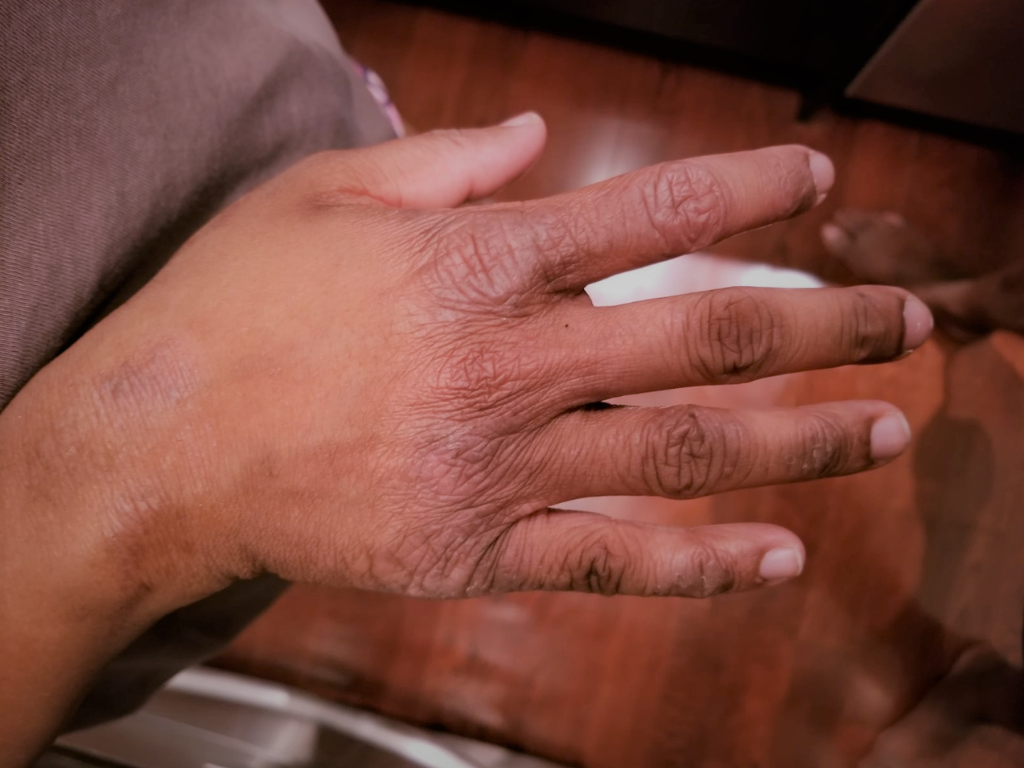Tanya Mohan has lived with eczema for most of her life. But it wasn’t until she ended up in an emergency room with injuries from scratching that the severity of her condition sunk in.

The then 29-year-old woke up in the middle of the night, covered in blood with a gash on her forehead.
“I had scratched so badly in my sleep that my eyes were swollen shut,” she recalled.
The incident forced Mohan to take a medical leave from work, during which she decided to shift her perspective on life with the chronic skin condition.
“This is how I have to live,” she realized. “But it’s about how I can live well.”
“Having this kind of eczema is like having chickenpox 24 hours a day, seven days a week,” said Mohan.
She still wakes up some mornings afraid to see if she’s done damage in her sleep, but with new medication, a growing support group and more perspective, Mohan has an improved quality of life.
Part of her healing process has been joining the Eczema Society of Canada (ESC) community where she is a support volunteer. In her work with the ESC, she has heard from caregivers and fellow sufferers across the country.
One of the universal feelings among people living with the condition is that the disease is widely misunderstood.
These are some of the most common myths debunked, presented in partnership with ESC.
Myth: Eczema is contagious
“You cannot catch it from being in the same room as someone, or touching the skin of someone who has it,” said Dr. Aaron Drucker, a dermatologist from Women’s College Hospital.
Despite scientific certainty, this is a lasting myth. Mohan remembers an incident in her 20s when she had mustered the courage to wear short sleeves in public and was accosted by a stranger on a Toronto streetcar.
“She berated me in public and thought it was contagious,” she said.
Myth: It has little impact on a person’s well-being
Eczema is much more than “just itchy skin”— an accusation Mohan has heard many times.
Recent studies have shown that atopic dermatitis, another name for the condition, can lower a person’s quality of life more than heart disease, diabetes and high blood pressure.
“Having this kind of eczema is like having chickenpox 24 hours a day, seven days a week,” said Mohan. “You can imagine what that does to someone’s psyche.”
Myth: All forms of eczema can be managed with moisturizer alone
Moisturizer can help improve the skin barrier, which is compromised in people with eczema. While patients with mild varieties of the condition can get away with a simple moisturizer regimen, Dr. Drucker said this isn’t the case for everyone.
“If you improve the skin barrier with moisturizing, you’re going to improve inflammation to a certain extent,” he said. “But for some people that’s not enough.”
In some cases, individuals may require interventions such as topical therapies to manage inflammation. It’s recommended to consult your health care provider if your eczema isn’t responding to your moisturizer regimen.
Myth: It’s caused by stress
Stress doesn’t cause eczema, said Dr. Drucker, but it can play a role.
“It’s a loop,” he said. “If you’re more stressed and you’re itchy, then you’re more likely to scratch the skin, which will then make the atopic dermatitis worse.”
Myth: Eczema isn’t chronic
Mohan was told her eczema would go away. “Don’t worry, you’ll grow out of this,” most people with the condition told her growing up. But it never happened for her.
“We used to think that that happened in the vast majority of patients,” said Dr. Drucker. “Now we think it still happens a lot of the time, but perhaps not as frequently as we used to think.”
Instead, for many patients with eczema, the condition comes and goes throughout life, or is what doctors call “relapsing and remitting.”
Myth: Nothing works
Dr. Drucker has read online blogs and heard from patients who say there is no solution for their eczema. While many patients can typically manage their eczema with skin care and topical medications, others with severe forms of the disease may need more intensive treatments such as phototherapy or systemic medications.
Mohan’s regimen once involved the application of a variety of topical creams several times a day, but she recently started a new treatment. After nearly four decades of suffering, the results have been positive.
“I feel like a normal person,” she said. “I’m able to enjoy whatever outing I’m on. I can get out of bed without worrying about showering or scratching overnight.”
To ensure Canadians have the best chance to access the care they need, ESC is asking individuals affected by eczema to share their stories on their social media pages using hashtags #LifewithEczema or #AdvocateforAD. For more information, visit www.eczemahelp.ca.




